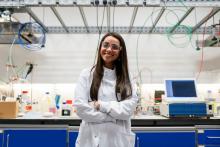The NINDS Intramural Research program is one of the largest scientific communities supporting research programs in basic, translational, and clinical neurosciences. Our principal investigators study a broad range of areas including channel biophysics, synapses and circuits, neuronal development, integrative neuroscience, brain imaging, and neurological disorders.
The NINDS training programs are vital to the success of our intramural laboratories. NINDS fellows participate in all aspects of neuroscience research, from basic science to clinical trial studies. To support our future leaders in the neurosciences, we offer an excellent training and mentoring environment through a wide range of activities and programs that support the professional needs and career development of students, health professionals, and research scientists.
Learn more about NINDS Training Programs
We offer research opportunities to all levels of trainees, from summer students to postdoctoral and clinical fellows(pdf, 45 KB). Select the programs below for more information:
|
Image
|
Summer Internship Programs |
|
Image
|
Postbaccalaureate Program |
|
Image
|
Graduate Student Programs |
|
Image
|
Postdoctoral Fellowships |
|
Image
|
Clinical Fellowship and Residency Programs |
Resources and Tools
NINDS seeks to attract trainees from diverse backgrounds, including, but not limited to:
- Students with disabilities
- Students who are Pell Grant-eligible
- Students who are or have been enrolled in Tribal Colleges and Universities, Hispanic-serving institutions, or Historically Black Colleges and Universities
- Students who identify as LGBTQ
- Students from groups underrepresented in the biomedical sciences (Blacks or African Americans, Hispanics or Latinos, American Indians or Alaska Natives, Native Hawaiians and other Pacific Islanders)
- Individuals disadvantaged by circumstances that have negatively impacted their educational opportunities, including natural disasters
Read more at Notice of NIH’s Interest in Diversity.






